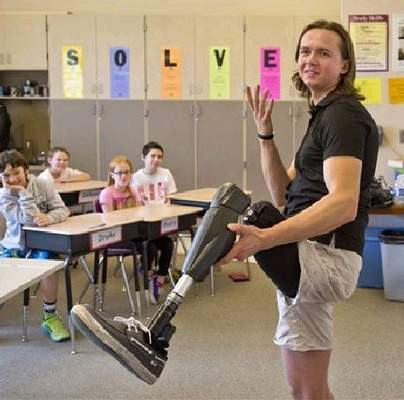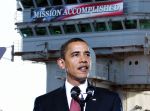The first six times Edward Lychik told his physical therapist he wanted to run again, she was noncommittal, and with good reason.
Videos by Rare
The combat veteran’s left leg had been amputated at the hip socket, and doctors had told him if he walked again, it would be on crutches.
Lychik ignored that diagnosis and kept talking to his physical therapist, Alicia White.
“The seventh time he said he wanted to run, I went in to see our prosthetist and said, ‘We’ve got a problem,” White said. “No one with this kind of amputation had ever run before, not like Edward wanted to run.
“We were still coming up with a walking leg, and he wanted to run mountain trails. He was talking about a marathon!”
An Army combat engineer at the age of 20, Lychik turned 21 in Afghanistan on a day that changed his life.
“I was riding in the back of our group and I was shot by a recoilless rifle,” Lychik said. “The medic in the same vehicle, ‘Doc’ Padgett, saved my life, got tourniquets on both my legs so I didn’t bleed to death. He did it with one hand wounded by shrapnel.
“I’d been through two explosions there already, had my one-man vehicle blown up. So I thought I knew what had happened. At one point I touched my left leg and thought I felt bone, and someone pulled my hand away and said ‘Don’t do that.’
“I almost lost both legs.”
Ukrainian-born, Lychik moved to Puyallup with his family as an 8-year-old. A shy kid who felt he was living in two worlds — Ukrainian at home, American at school — he never felt at home in either.
“I just never seemed to fit. High school was a low point, and I almost dropped out entirely. I finished by being home-schooled,” he said.
He enlisted in the Army and was a specialist assigned to a Stryker brigade at Fort Wainwright, Alaska. Whatever life he’d anticipated changed on that Sept. 30, 2011, birthday in Afghanistan.
His wounds required complete amputation of his left leg and numerous operations on his right, where a ham-sized mass of muscle was blown away by the bullet.
In a San Antonio hospital staffed with Army doctors, Lychik was told walking without assistance would be impossible. He dreamed of running again, and his commitment moved both White, his physical therapist, and Bob Kuenzi, his prosthetist.
“I never said, ‘No, you can’t,’ but there was nothing I could find anywhere that indicated it could be done with his level of amputation,” Kuenzi said. “I told him to walk first, then we’d work on it.”
Kuenzi laughed. “A few months later, he was walking.”
Together, Kuenzi and Lychik tinkered with a running leg, trying seemingly endless combinations of parts and pieces, making it up as they went.
“At first, we basically gave him a pogo stick,” White said.
In the end, the running leg was anchored by a belt around Lychik’s waist and a harness that fit his pelvis.
“Two weeks after we finished the prosthesis, Edward wanted to run a Tough Mudder competition — a 12-mile obstacle course,” Kuenzi said. “I thought that was crazy.”
Lychik ran it and finished. Then he began talking about a marathon.
White told him about the Martin W. Richard Charitable Foundation, which was formed to honor the memory of the 8-year-old boy killed in the 2013 Boston Marathon bombing. The foundation will have a team of runners at this year’s race.
“I contacted them,” Lychik said. “On April 21, I’m going to run the Boston Marathon.”
As much as he’s been working toward that goal, the former soldier has found time for another: He wants to speak to young people in the communities around him.
“I’ve been working on a speech, an approach, and re-working it for weeks,” said Lychik, who’s now 23 and living in Tacoma. “Speaking to kids — I think that’s my purpose.”
His first chance was last week at Puyallup’s Maplewood Elementary School, for teacher Scott Caufield’s fifth- and sixth-grade classes. Lychik’s younger brother, Yakov, was in the audience. So was Maplewood Principal Susan Walton.
“In my hospital bed, I was always thinking about what I could no longer do,” Lychik said. “Once I’d run, I began thinking of what I could do. I wanted to inspire people so they would accept me. What I needed was to accept myself.”
Lychik’s rapport with the students was nearly instant, and he was delighted by the Q&A session afterward. When a young girl asked if he could do a pushup, he said he could — with help. Four students wound up doing pushups with him.
“Edward was super-dynamic, connected with those kids in a wonderful way,” Walton said. “He showed challenges can change your life for the better. He was candid — things are hard. It inspired me.
“I’m going to have him back and I’m going to spread the word through our district.”
Back in San Antonio, Kuenzi choked up a bit talking about Lychik.
“He pushed me, and we developed something that can now be used for young cancer patients who lose a leg,” Kuenzi said. “Edward is unique, a world-class athlete. I’m 59 years old, and working with him was the highlight of my career.”
Lychik loves to hear that, but he’s looking ahead. Beyond the Boston Marathon, he wonders about running an ultramarathon, which might cover 100 miles. He wants to speak to other classes, other schools.
“This leg is a tool for me to inspire others. If I can do things on one leg, what can you accomplish with two?” he asked. “The leg isn’t a burden, it might be a gift. My life is just beginning.”
Copyright 2014 The Associated Press. All rights reserved. This material may not be published, broadcast, rewritten or redistributed.



